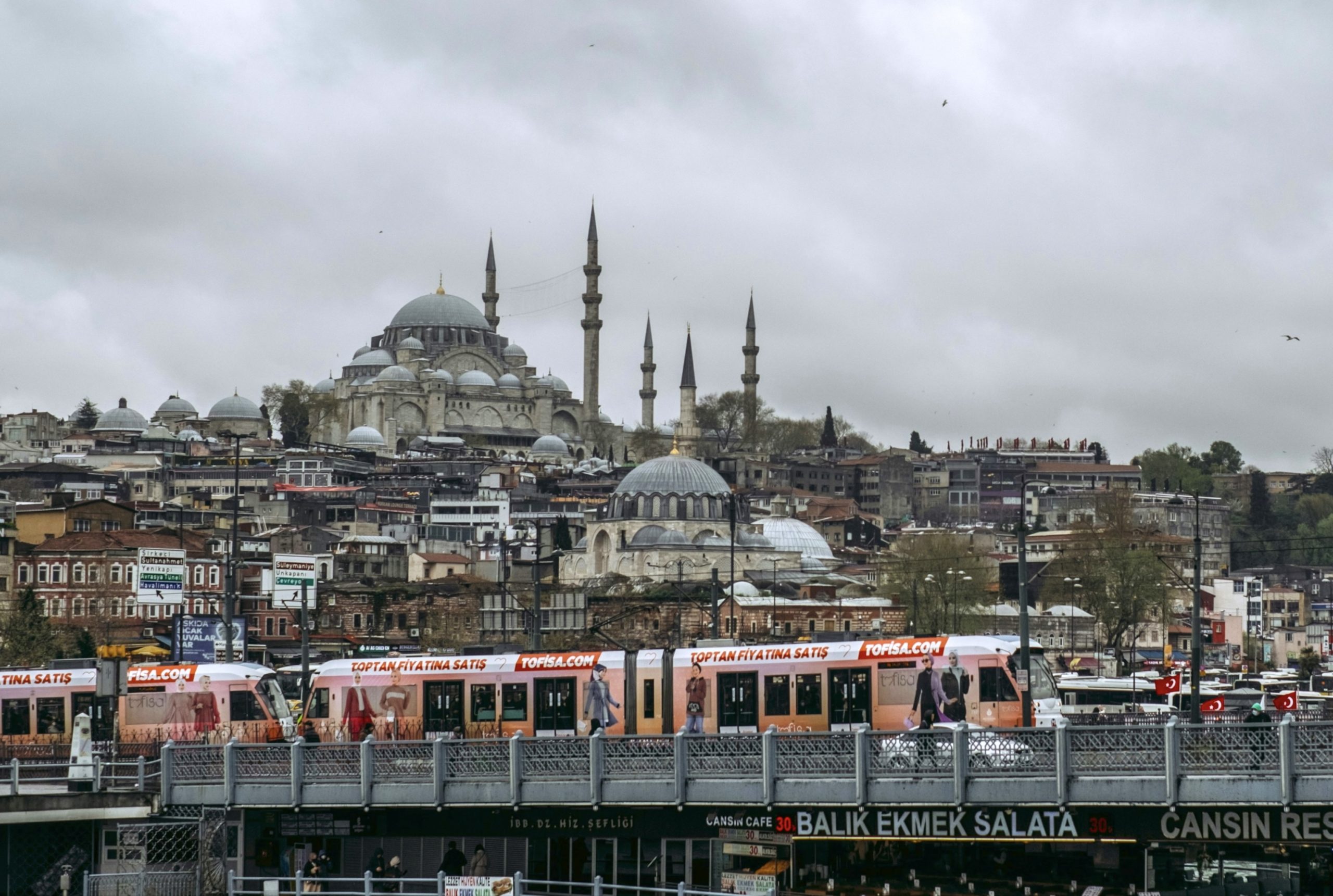The Caliphate on the Orient Express

The Islamic world of the early 1900’s was shaken to the core. The superpowers of the United Kingdom, France and Germany had burst out of the West with huge advancements in weapons, science and engineering, leaving Muslim countries in the Arabian dust. British war ships and trading ships plied the waters of the Mediterranean, the Red Sea, the Persian Gulf and the Indian Ocean, turning primitive Arabic-speaking principalities into Crown Colonies and Protectorates. Crisp British-uniformed brigades marched into Muslim marketplaces and souqs to the wail of Scottish bagpipes, manifesting imperial power among poverty-stricken dictatorships whose livelihood had up to that point consisted of date farming, dhow-based fishing industries, and diving for pearls. The imminent downfall of the Ottoman caliphate would be “the proof of the pudding” for some Arab thinkers and philosophers: something had drastically failed in the Islamic world.
- The collapse of the Caliphate would kick-start the rise of Twentieth Century radical jihadi Islam.
Blood in the streets
Bob Dylan once said, “There’s a battle outside and it is raging. It’ll soon shake your windows and rattle your walls . . . As the present now will later be past. The order is rapidly fading, for the times they are a-changin’” (‘The times, they are a changin’’; © 1963, 1964 by Warner Bros. Inc.; renewed 1991, 1992 by Special Rider Music). Rivers of blood accompanied the dawn of the 20th century, both in Europe and the Caucasus. The revolutionary rise of subject nations desiring to be free – and the corresponding crushing of these movements with great cruelty – let to millions being murdered, raped and exiled during this time. These included:
- the Russo-Turkish War (1877–1878), with between 200,000 and 330,000 killed (including 30,000 Bulgarians massacred by Ottoman troops May 11-June 9 1876 and 100,000 Bulgarian refugees; over 200,000 Muslims killed through famine, disease and massacres, and up to 500,000 refugees)
- the Circassian genocide in Western Caucasus, by Russia’s Tsarist army (1863-1878), with between 625,00 and 1.5 million murdered, and 500,000 died while fleeing, involving mass killing, mass rape, death marches, exceedingly brutal torture and impalement of enemies, forced starvation, etc. 95-97% of all Circassians were murdered
- the Armenian/Hamidian massacres (1894-97) named after Turkish Caliph Sultan Abdul Hamid II: up to 300,000 Armenian and Assyrian Christians massacred, at least 50,000 orphaned children as a result, accompanied by looting, forced conversion, mass rapes, ethnic cleansing
- the First Balkan War (1912–1913) and Second Balkan War (1913), with over 49,000 killed on the Balkan side (Bulgaria, Greece, Serbia, Montenegro) and 56,000 killed on the Ottoman Turkish side
- the Armenian Genocide (1915-16, and 1922-23) with 1.5 million Armenians murdered out of a total of 2.5 million Armenians in the Ottoman Empire, set into action through the passing of the Tehcir (‘Temporary Law of Deportation’) by the Turkish Ottoman Council of Ministers on May 27 1915, authorizing the deportation of all Armenian Ottoman citizens.
The conquest of Caliphate Constantinople
WWI was drawing to an end in the Middle East. On October 30 1918 British Admiral Somerset Arthur Gough-Calthorpe and Ottoman Minister of Maritime Affairs Hüseyin Rauf Orbay signed the Armistice of Mudros on board HMS Agamemnon in Moudros harbor on the Greek island of Lemnos, bringing combat in that theater to an end. French troops entered Istanbul/Constantinople on November 12 1918, with British troops following on November 13, and an Italian battalion entering on February 7 1919. This was the first time since 1453 (the Fall of Constantinople) that the keys to that city had changed hands – from Islamic to Christian.
The Treaty of Versailles was signed June 28 1919 in the Palace of Versailles’ Hall of Mirrors, and ratified by the defeated forces of Germany. On August 10 1920 the Treaty of Sèvres was signed (but not ratified) between the Principal Allied Powers and the Ottoman Empire. Had this treaty been ratified, large parts of Ottoman territory would have been partitioned and handed over to France, the UK, Greece and Italy. However, the treaty aroused great hostility among various streams of Turkish leadership, led by Mustafa Kemal Atatürk. This led to both the Turkish War of Independence (May 19 1919–October 11 1922) and the Turkish National Movement (June 22 1919–October 29 1923). These in turn led to the abolition of the Ottoman sultanate on November 1 1922, the declaration of the Republic of Turkey on October 29 1923, and the abolition of the Ottoman Caliphate on March 3 1924.
The divvying-up of the Ottoman Empire had been foreseen and planned in the British-French Sykes-Picot Agreement (ratified May 9-16 1916). In the event of an Allied victory, the Ottoman Empire would be divided as follows:
- Britain would control Jordan, southern Iraq, and the ports of Haifa and Akko, though part of what was then labeled ‘Palestine’ would fall under “international administration”
- France would control southeastern Turkey, the Kurdistan Region, Syria and Lebanon
- Russia would control Western Armenia, Constantinople and the Turkish Straits
- Italy would control southern Anatolia
As a result of Turkish military opposition to the crushing terms of the Treaty of Sèvres , the Western Allies stepped back from pushing that agreement, and replaced it with the Treaty of Lausanne. Lausanne was ratified between August 23 1923 and July 16 1924, and signed in the Palais de Rumine in Lausanne, Switzerland, on July 24 1923. The Treaty established the following:
- It recognized the sovereignty of the new Republic of Turkey
- It restricted the boundaries of Greece, Bulgaria and Turkey
- It forced Turkey to relinquish all claims on the Dodecanese Islands, Cyprus, Libya, Egypt, Sudan, Syria, Iraq, Yemen, Asir, the Hejaz and Medina
- It did not recognize Armenia’s territorial hopes. Armenia was granted only a small homeland area in Soviet-controlled territory
In this treaty Lausanne granted immunity to Turkish Ottoman soldiers and military leaders for crimes they committed between 1914 and 1922 against the Armenians and the Greeks. In doing this, Lausanne established the legal right of state governments to expel large parts of their citizens on the grounds of ‘otherness’. Some seeds from this malevolent weed would sprout with a vengeance less than twenty years later during Hitler’s Holocaust.
Caliph on the Orient Express
The defeat of Caliphate forces on the battlefield and the conquering of the Caliphate’s capital city of Constantinople/Istanbul were events which echoed deeply in the soul of the Islamic world. For many, it would mark the zenith of the Infidel West’s domination of Islam. Many years later Osama bin Laden would reflect this perspective less than 30 days after 9/11 in his videotaped address on October 7, 2001:
- “Here is America struck by God Almighty in one of its vital organs, so that its greatest buildings are destroyed. Grace and gratitude to allah. America has been filled with horror from north to south and east to west, and thanks be to allah. What America is tasting now is only a copy of what we have tasted. Our Islamic nation has been tasting the same for more than 80 years of humiliation and disgrace, its sons killed and their blood spilled, its sanctities desecrated.”
Professor Bernard Lewis (deceased), formerly Cleveland E. Dodge Professor Emeritus of Near Eastern Studies, Princeton University, noted in his article ‘The Revolt of Islam’:
- “We can be fairly sure that bin Laden’s Muslim listeners – the people he was addressing – picked up the allusion immediately and appreciated its significance. In 1918, the Ottoman sultanate, the last of the great Muslim empires, was finally defeated – its capital, Constantinople, occupied, its sovereign held captive, and much of its territory partitioned between the victorious British and French Empires. The Turks eventually succeeded in liberating their homeland, but they did so not in the name of Islam but through a secular nationalist movement. One of their first acts, in November, 1922, was to abolish the sultanate. The Ottoman sovereign was not only a sultan, the ruler of a specific state; he was also widely recognized as the caliph, the head of all Sunni Islam, and the last in a line of such rulers that dated back to the death of the Prophet Muhammad, in 632 A.D. After a brief experiment with a separate caliph, the Turks, in March, 1924, abolished the caliphate, too. During its nearly thirteen centuries, the caliphate had gone through many vicissitudes, but it remained a potent symbol of Muslim unity, even identity, and its abolition, under the double assault of foreign imperialists and domestic modernists, was felt throughout the Muslim world.”
At the end of the Turkish War of Independence, the Ottoman Empire became defunct. The Turkish National Movement’s Grand National Assembly took over the government of the new Republic. They then voted to take two drastic measures: one, to separate the caliphate from the sultanate into two separate offices; and two, and to abolish the Ottoman Sultanate – which act they legislated on November 1 1922. On November 19 1922, Crown Prince Abdülmecid II was elected Caliph (the 28th and last Ottoman caliph) by the Turkish National Assembly. Abdulmejid chose to use the ceremonial title Halîfe-i Müslimîn (‘Caliph of the Muslims’) to describe his status, instead of the more traditional Emîrü’l-Mü’minîn (‘Amīr al-Muʾminīn’; Commander of the believers).
But the position had been stripped of any authority, and Abdulmejid’s purely ceremonial reign would be short-lived – sixteen months in toto. When Abdulmejid was declared caliph, Kemal refused to allow the traditional Ottoman sword ceremony to take place, bluntly declaring: “The Caliph has no power or position except as a nominal figurehead” In response to Abdulmejid’s petition for an increase in his allowance, Kemal wrote: “Your office, the Caliphate, is nothing more than a historic relic. It has no justification for existence. It is a piece of impertinence that you should dare write to any of my secretaries!
- On October 29 1923, the National Assembly declared Turkey a republic, and proclaimed Ankara its new capital. After over 600 years, the Ottoman Empire had officially ceased to exist.
Abdulmejid II served as caliph under the authority of the newly founded Turkish Republic until March 3 1924, when the Grand National Assembly of Turkey and President of the Turkish Republic (Mustafa Kemal Atatürk) constitutionally abolished the caliphate and ordered Abdulmejid into exile. The ex-caliph and his family entourage (and 725 Kg of personal luggage) left the Dolmabahçe Palace at 05:00 the next morning, before boarding the ‘Simplon Express’ (also called ‘The Orient Express’) from the Çatalca Train Station, bound for Switzerland. Abdulmejid stayed at the Grand Alpine Hotel on the shore of Lake Geneva. He later moved to Nice on the French Riviera in October 1924, and finally to Paris, where he dedicated his time to painting, playing the piano, and collecting butterflies. He passed away on August 23 1944 of a heart attack, which date coincided with the liberation of Paris from Nazi occupation. The Turkish government did not permit him to be interred in Turkey, so his remains were preserved at the Grand Mosque of Paris for ten years. His body was eventually transferred to Medina, Saudi Arabia where he was subsequently buried.
The last sultan of the Ottoman Empire, Mehmed VI, died at his San Remo, Liguria, Italy exile on May 16 1926 and was buried at the Sulaymaniyya Takiyya mosque complex in Damascus, Today the royal family of these previous sultans and caliphs is known as the Osmanoğlu family.
In March 1924, Muhammad al-Jizawi, Rector of Cairo‘s prestigious al-Azhar University, in direct response to the collapse of the Caliphate, issued a statement calling for a possible pan-Islamic conference to elect a new Caliph:
- “Whereas the Caliphate in Islam implies general control of the spiritual and temporal affairs of Islam; Whereas the Turkish Government deprived the Caliph Abdul Mejid of his temporal powers, thereby disqualifying him from becoming Caliph in the sense that Islam required; seeing that in principle the Caliph is destined to be the representative of the Prophet, safeguarding everything concerning Islam, which necessarily means the Caliph should be subject of respect, veneration and obedience; and whereas the Caliph Abdul Mejid no longer possesses such qualifications and has not even the power to live in his native land; now therefore it has been decided to convene an Islamic conference in which all Muslim nations shall be represented in order to consider who should be appointed Caliph.”
The abolition and exile of the last Ottoman Caliph did not mean that the hopes and vision of a reborn Caliphate had died. The 20th century would see this hope become a major motivator and stimulus to a reborn jihadi movement that would shake both the Middle East and the Western world to its foundations.
How shall we then pray?
- Pray for revelation and courage to be given to Israel’s leaders in political, intelligence and military spheres – to understand and counteract strategies against Israel, the apple of God’s eye (Zechariah 2:8) – as Islamic State/al Qa’eda armies gather at our borders.
- Pray that enemy strategies against the Jewish people and their state, against Middle East Christians and other minorities – will be confounded, and that a great harvest would take place in all of these areas!
- Pray for the protection of Israeli and Jewish people from the assaults of jihadi terror organizations and Western fellow-travelers
- Pray for the return of the Jewish people to both the Land and the Messiah of Israel
- Pray for the physical rescue of the approximately 44 to 50 living Israeli hostages (including babies) kidnapped by Hamas, Islamic Jihad and PFLP/PLO. At this moment some of these hostages are being tortured, raped and starved (this based on testimonies of recently released hostages). Sadly, over 100 of all Israeli hostages are dead; Hamas is holding on to their corpses as cold storage bargaining chips
- Pray for the raising up of Ezekiel’s prophetic Jewish army throughout the earth
Your prayers and support hold up our arms and are the very practical enablement of God to us in the work He has called us to do.
In Messiah Yeshua,
Avner Boskey
Donations can be sent to:
FINAL FRONTIER MINISTRIES
BOX 121971 NASHVILLE TN 37212-1971 USA
Donations can also be made on-line (by PayPal or credit card) through: https://davidstent.org/

